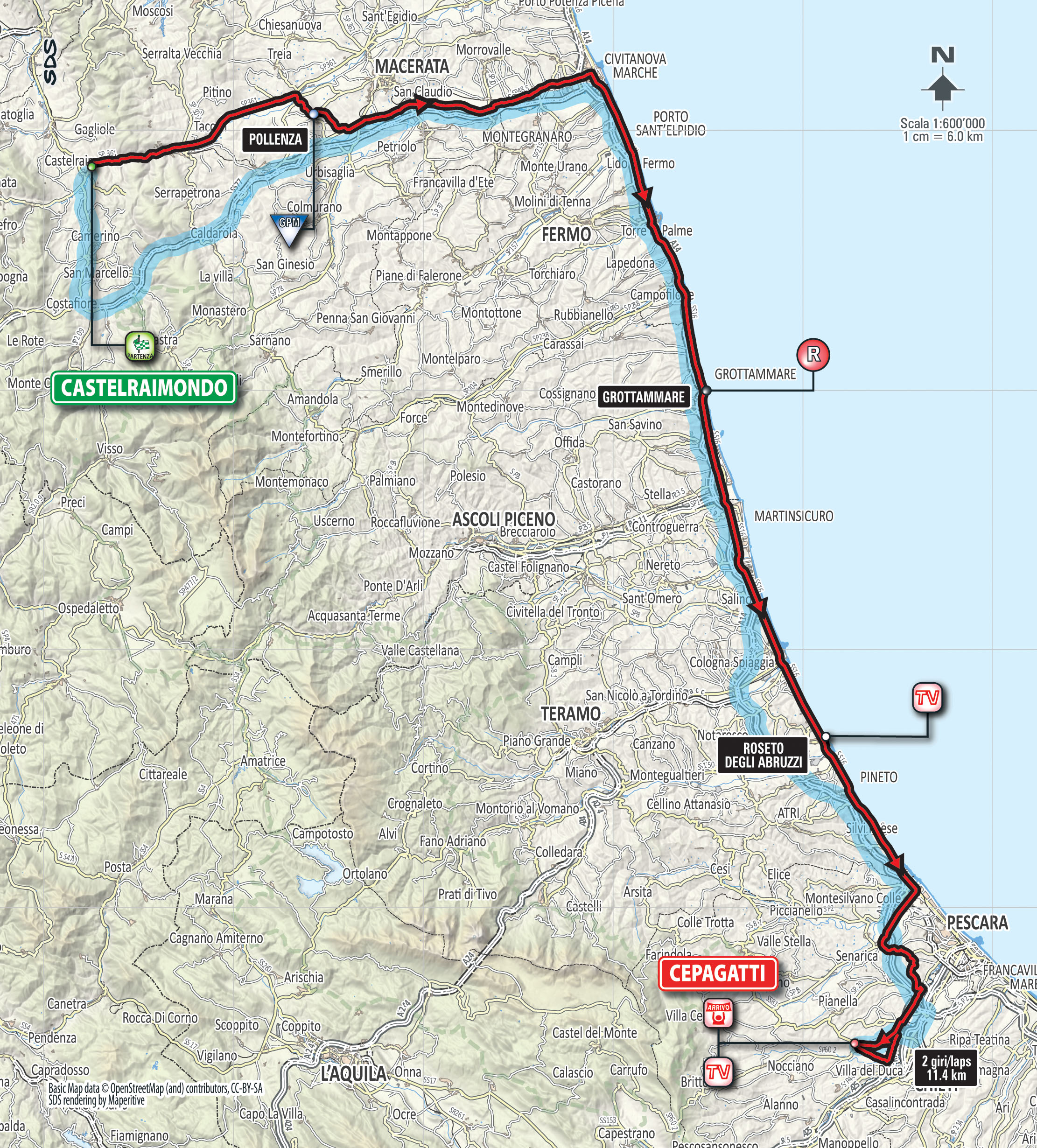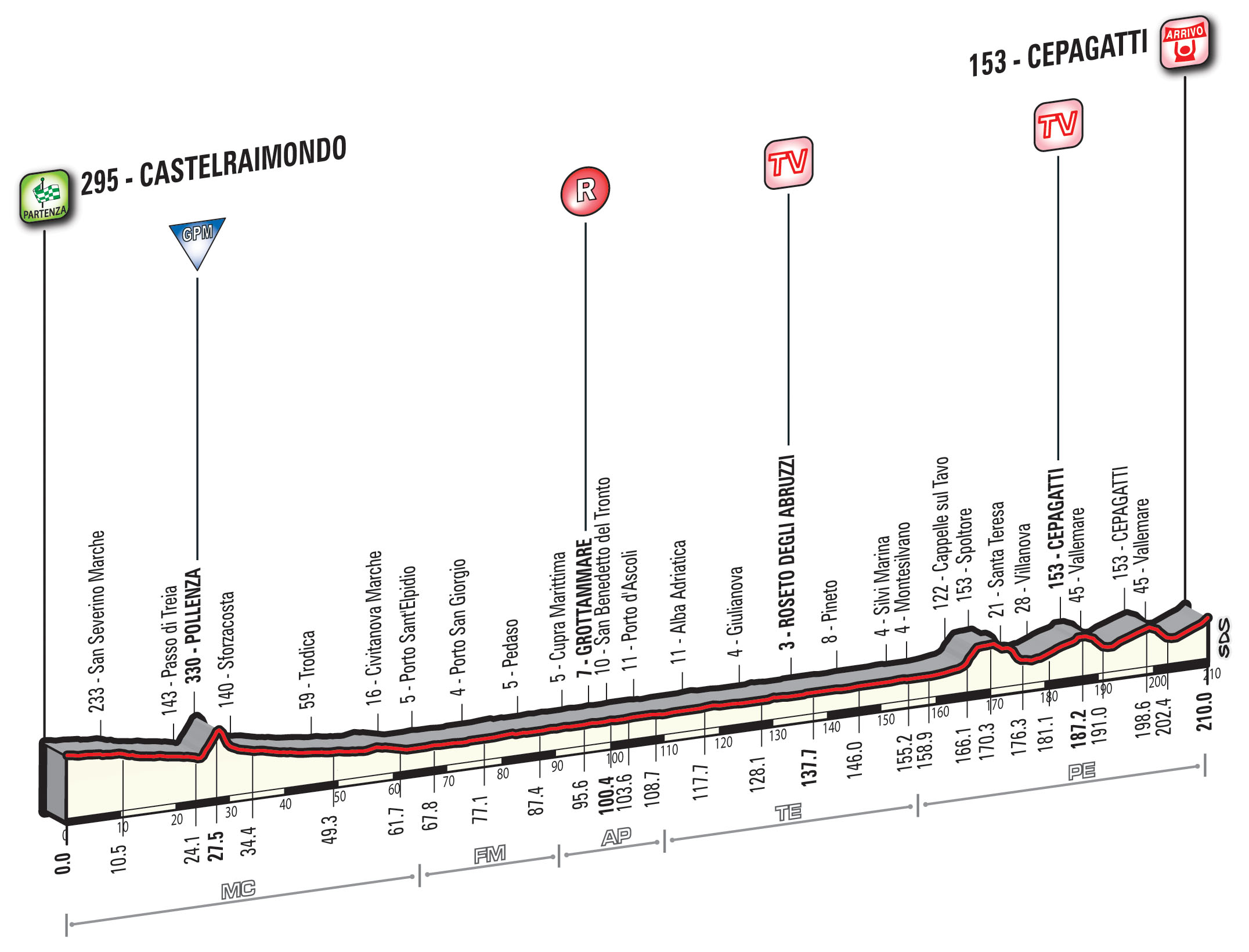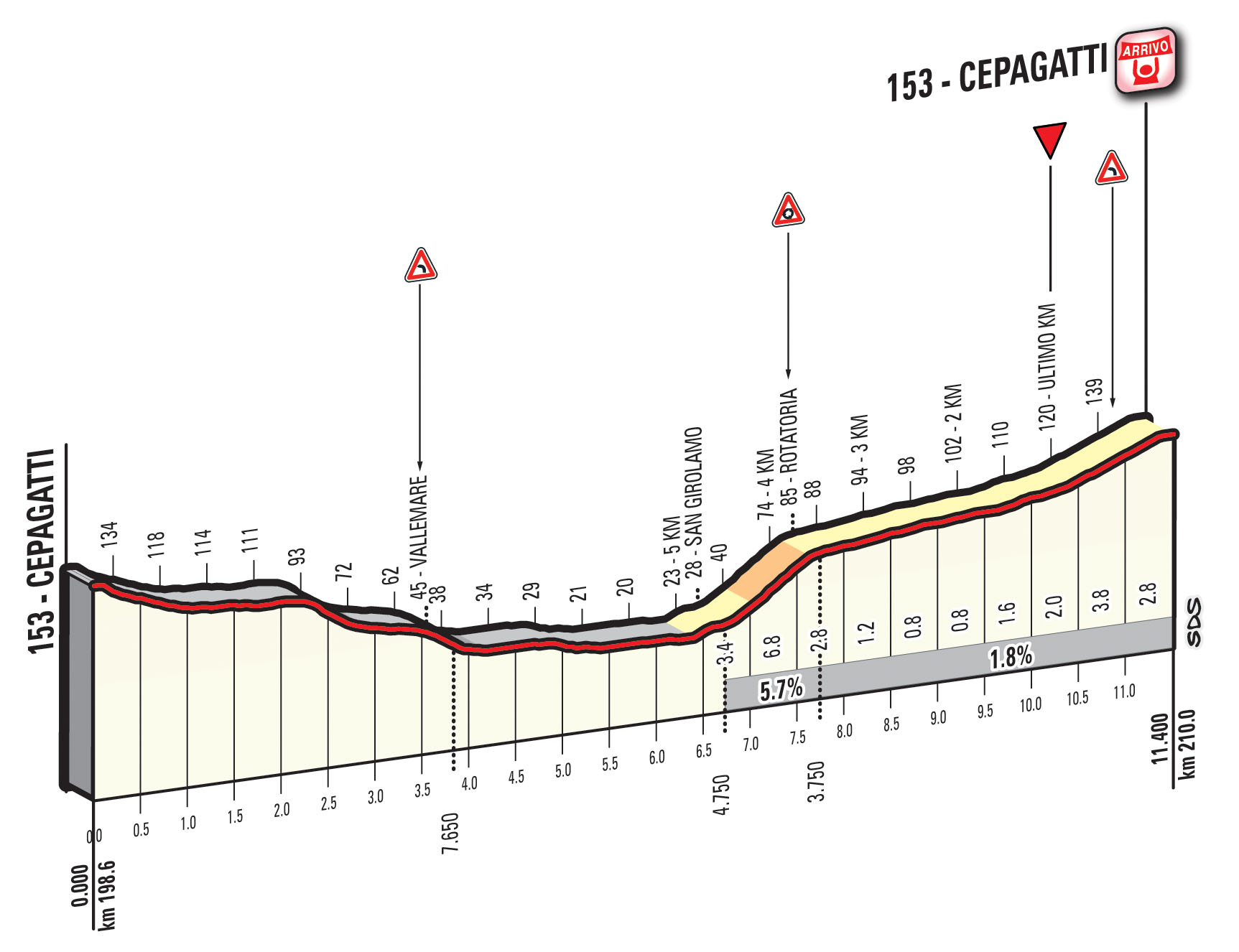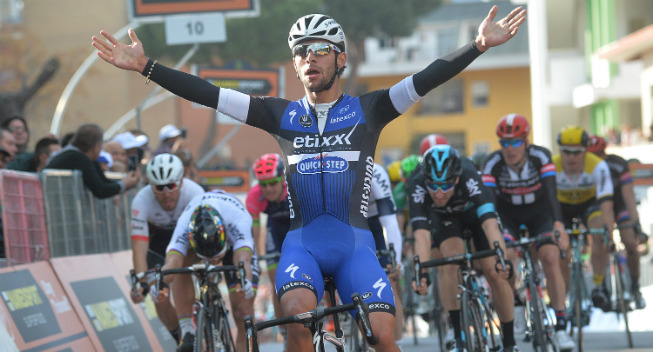The cancellation of the queen stage suddenly changes the nature of Tirreno-Adriatico which is no longer a race for stage racers. Instead, the classics riders and time triallists are now aiming for the overall victory and with bonus seconds on the line what should have a traditional sprint stage can suddenly turn into a decisive day in the fight for the overall win in Italy’s second biggest stage race.
The course
After the brutally hard 2013 edition of the race, the organizers decided to give the sprinters a goal in the second half of the race by including a sprint stage on the penultimate day in 2014. Last year they repeated the formula but a late climb changed the script and led to a reduced bunch kick. This year the sprinters don’t have to handle such difficulties but a slightly rising finish could be challenge as they aim to test their speed less than a week before Milan-Sanremo.
At 210km, it is another very long stage – perfect to prepare for Milan-Sanremo. It brings the riders from Castelraimondo to Capagatti. The stage runs basically flat all the way to the finish, where a final circuit will be covered twice. The peloton has almost completed the journey to the Adriatic coast and the first part will bring them to the seafront. The route leaves Castelraimondo, leads through San Severino Marche and Passo di Treia to tackle the only KOM climb of the day (3.4km, 5.5%, max. 10%, the last one of the whole race) in Pollenza after 27.5km of racing. After the descent, the route levels out and rolls along the coast up to Montesilvano along completely flat roads. There’s an intermediate sprint at the 137.km mark. From here and following a few short, gentle undulations, it leaves the coast just before Pescara to head for Cepagatti where two final laps will be covered. There will be an intermediate sprint at the first passage of the line.
The final 11.4km circuit has a triangular shape. The first side runs downhill, the second one is flat, while the third one runs constantly uphill (a little more sharply at the beginning where it averages 5.7% over 1km and at approx. 2-3% after that, with the final 1.5km being the steepest) up to the finish line. There are no major technical challenges as there’s a roundabout just after the 4km to go mark and from there it is an almost completely straight road. There’s a final left-hand turn 400m from the finish. The stage finale follows the historical 1990s Cepagatti circuit (with just a few minor changes).
Cepagatti has not hosted a stage of a major bike race for more than a decade.



The weather
Both Paris-Nice and Tirreno-Adriatico have been marred by bad weather and it seems that it won’t be much better in the final part of the Italian race. Monday is forecasted to be a cloudy day with a 30-40% chance of rain for most of the day. The maximum temperature at the finish will be 11 degrees.
There will be a moderate wind from a northerly direction which means that the riders will first have a crosswind and then a tailwind for most of the day until they get to the circuit. Here it will be a crosswind in the first part, then a headwind and finally a cross-tailwind and crosswind in the uphill part until they turn into a tailwind for the short finishing straight.
The favourites
The organizers of Tirreno-Adriatico have turned the race into a mini grand tour in recent years. A few years ago it was a race for classics riders but nowadays the grand tour contenders come to the fore. However, the cancellation of the queen stage has suddenly turned time back and completely changed the nature of the race which is now open to the riders who dominated in the past while the good time triallists also aim for overall victory.
While Greg Van Avermaet, Bob Jungels and Peter Sagan lick their lips as they can suddenly aim for the overall victory, it has been a hugely frustrating experience for the pre-race favourites. Of the four riders who were originally set to battle for overall victory – Tejay van Garderen, Vincenzo Nibali, Alejandro Valverde and Thibaut Pinot – only the American is still in contention. At the same time, they lost the chance to score very important WorldTour points for their teams and missed an important test. It has even prompted Vincenzo Nibali to may skip the Giro as he fears for more cancellations and he may now add the Volta a Catalunya to his schedule.
Furthermore, Tony Martin and Fabian Cancellara must really regret that they didn’t look at the weather forecast a bit more closely. Both of them would definitely have been able to handle the climbing in the first half of the race and Martin would have been the overwhelming favourite to win the race after Etixx-QuickStep’s good team time trial if he hadn’t lost time in the previous stages.
It will now all come down to the final two stages. Before the race, tomorrow’s stage should have been a transitional one which should offer the sprinters and puncheurs a chance to shine. Now it suddenly becomes hugely important. As things stand now, the race will be a battle between Greg Van Avermaet, Bob Jungels, Tejay van Garderen and Peter Sagan who are the strongest riders for a short, flat time trial among the riders within a reasonable distance of Zdenek Stybar. If nothing changes in the road stage, Jungels is probably the favourite but there will be very important bonus seconds up for grabs for Sagan and Van Avermaet and so tomorrow’s stage can really have a big impact on the final GC.
That also means that there is no chance that this race will be won by a breakaway. The bonus seconds are so important that the early escapees will have no chance. Many riders will be looking for a good hit out before Sanremo so it should be a fast start and the crosswind will make things dangerous early on. However, things should calm down when we hit the tailwind on the coastal road.
Etixx-QuickStep will be aiming for another stage win with Fernando Gaviria so they will again have to do the majority of the work. Tinkoff could lend them a hand and Orica-GreenEDGE are likely to come to the fore. Hence, the break will be caught before we get to the finale.
It will be interesting to see whether they want to catch the break before the final intermediate sprint. Sagan and Van Avermaet will probably have to save their legs for the final sprint so it offers a great chance for Zdenek Stybar and Bob Jungels to try to pick up a few bonus seconds.
The circuit is not flat as the final five kilometres are slightly uphill. However, only the first kilometre is a bit steep and the rest of the climb is manageable for most of the sprinters. To win the stage, Sagan and Van Avermaet both need the race to be as hard as possible so we wouldn’t be surprised if those two teams go full gas whenever they climb towards the finish.
In the end, it will be decided in an uphill sprint. It’s an uncomplicated final from a technical point of view and it will be mostly about power in the legs on the drag up to the line, with lead-outs playing less of a role in this kind of finish. However, the strong crosswind could come into play and it will be important to have teammates to keep you protected in the finale.
We have never had much doubt that Fernando Gaviria is the fastest rider in this field and he confirmed our trust in him by winning stage 3. It was a close battle with Caleb Ewan but the Colombian had the edge. The finale of this stage is a bit harder but that should do nothing to challenge Gaviria who is a great climber too. Yesterday he was in the second big chasing group and in fact it should be an advantage for him that the finale is a bit harder.
Gaviria is also supported by a very strong team. They didn’t really time things well in stage 2 but Gaviria positioned himself perfectly on Sagan’s wheel. They don’t have the best train here but an in-form Matteo Trentin is one of the best lead-out men in the world. If he can keep Gaviria in a reasonable position, no one will be able to beat the Colombian.
The only rider who has the speed to challenge Gaviria in this finale is undoubtedly Caleb Ewan. He didn’t miss much in stage 3 and he should be up there again. His tiny stature means that he is strong in uphill sprints – just recall how he beat Sagan and Degenkolb in a much harder finale at last year’s Vuelta – but he is not climbing as well as Gaviria. This uphill drag is a long one which will make it a bit harder for Ewan. His train with Keukeleire and Mezgec is solid but they don’t have much experience in working together. It will be harder for Ewan to win this one but he is still the rider with the best chance to beat Gaviria.
In stage 3, it was evident that Peter Sagan doesn’t have the same speed as Gaviria and Ewan. However, he has two advantages in this stage. First of all, the finale is harder and he is a stronger rider than both the youngsters. Furthermore, Tinkoff proved their superiority in the lead-out in stage 3. Daniele Bennati, Oscar Gatto and Adam Blythe did really well and if he can again get the perfect lead-out, the tough finale means that Sagan has a chance to win.
On paper, it’s a very good sprint for Giacomo Nizzolo who really likes these uphill sprints and he is climbing better and better. However, he was a bit ill before the race and is not in his best condition. He doesn’t have too high expectations but he hopes to have improved for this stage. Fabian Cancellara and Jasper Stuyven mean that he has lots of firepower for the lead-out and he is great at positioning himself. We expect a much better performance from Nizzolo this time.
Elia Viviani is one of the fastest riders here which he proved with his third place in stage 3. However, this is literally an uphill battle for him. He doesn’t have a lead-out so he has to fend for himself in the hectic finale. Furthermore, this finale could be a bit too hard for him. He is not bad in an uphill sprint – he won in Genova at last year’s Giro – but this uphill drag could be a bit too long for him.
Sacha Modolo was hugely disappointed in stage 3. He was in the perfect position when the sprint was launched but he didn’t have the speed to match the faster guys. However, he has been in great condition all year and was actually sprinting really well in the Middle East. His new lead-out with Roberto Ferrari and Federico Zurlo works really well and he likes this kind of uphill sprint.
Dimension Data have both Mark Cavendish and Edvald Boasson Hagen. However, the Brit is not in his best road racing form and so it makes little sense for him to try in such a hard finale. Instead, the team will be riding for the Norwegian who likes an uphill sprint. However, he probably needs it to be harder to win the stage.
This season has really turned things around for Leigh Howard after some disappointing years at Orica-GreenEDGE. He is now climbing better than ever and he is also sprinting well. IAM have a very good lead-out here which they proved in stage 3 but this finale will probably be too hard for most of the heavy guys. This will give Howard less of a chance and he is also not fast enough to win.
Jens Debusschere was nowhere to be seen in stage 3 which was frustrating for last year’s stage winner. However, he has proved to be in great form and he has a great support from Jurgen Roelandts. He should be strong in a harder finale and would love to prove himself ahead of Milan-Sanremo after Greipel has been forced to skip the race.
Moreno Hofland has won an uphill sprint in Paris-Nice. This is the finale that he likes and LottoNL-Jumbo are doing a lot to give him a real lead-out train. They messed it up in stage 3 but they have the power to deliver him in a good position.
Finally, Greg Van Avermaet deserves a mention. He will definitely try his hand in this uphill sprint. He has a decent turn of speed but he probably needs it to be harder to finish in the top 3 and pick up the valuable bonus seconds.
More riders that can do well here are Davide Vigano, Francesco Gavazzi, Sonny Colbrelli, Jose Goncalves, Pello Bilbao, Ramunas Navardauskas, Simone Ponzi, Anthony Roux, Nikias Arndt, Zico Waeytens and Marco Haller.
CyclingQuotes’ stage winner pick: Fernando Gaviria
Other winner candidates: Caleb Ewan, Peter Sagan
Outsiders: Giacomo Nizzolo, Elia Viviani, Sacha Modolo
Jokers: Edvald Boasson Hagen, Jens Debusschere, Moreno Hofland, Greg Van Avermaet
| Jose Miguel ELIAS GALINDO 48 years | today |
| Xinyang MA 24 years | today |
| Chol Dong HYUN 36 years | today |
| Gaopalelwe KELAETSWE 29 years | today |
| Andrea NOÈ 56 years | today |
© CyclingQuotes.com









